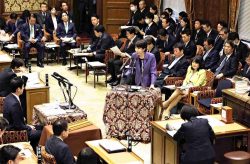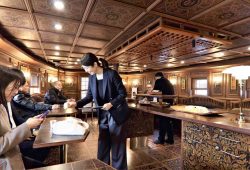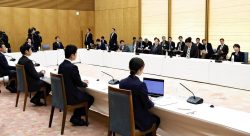New Cabinet must deal with mountain of challenges / Present vision for nation in lower house poll
12:33 JST, October 5, 2021
There are numerous problems to be tackled both domestically and internationally. The new Cabinet must address these issues without delay. The government and the ruling parties need to cooperate closely and make every effort for that purpose.
The Cabinet led by Prime Minister Fumio Kishida has been launched. “The two wheels of the cart to realize a new capitalism are the growth strategy and the distribution strategy,” Kishida said at a press conference.
The prime minister announced his policy to dissolve the House of Representatives on Oct. 14 and hold a lower house election, with the official start of campaigning on Oct. 19 and voting and ballot counting on Oct. 31. This will be the first lower house election in four years. The ruling and opposition parties must clearly present their vision for the nation and specific measures to achieve that vision, and ask for the trust of the public through the national election.
Path for controlling virus
Of the 20 Cabinet members, 13 were appointed to cabinet posts for the first time.
Takayuki Kobayashi was appointed to the newly established post of economic security minister, Karen Makishima was named digital minister and Noriko Horiuchi was made minister in charge of vaccine programs. They are all relatively junior lawmakers in the Liberal Democratic Party, having been elected to the lower house three times. They have been involved in policy planning and coordination within the LDP.
Their selection was apparently aimed at giving the public the impression of a fresh party, by appointing mid-ranking and younger party members to important posts, a move that Kishida called for during the LDP presidential election.
On the other hand, Hirokazu Matsuno, a member of the LDP’s largest faction, led by Hiroyuki Hosoda, was appointed chief cabinet secretary, a key position in the Cabinet, while Shunichi Suzuki of the faction led by LDP Vice President Taro Aso was appointed finance minister.
Kishida seems to be trying to stabilize his administration’s power base by showing consideration for each faction. To gain support from the public, it is necessary to steadily achieve results.
While the cabinets of the two most recent prime ministers, Shinzo Abe and Yoshihide Suga, had increasingly made policy decisions at the initiative of the Prime Minister’s Office, the ruling parties are said to be losing ground. There is also speculation that during the Kishida administration, the LDP will increase the party’s influence under the leadership of LDP Vice President Aso and Secretary General Akira Amari.
It would be detrimental for the government and the ruling parties to fight for leadership. It is vital to put in place a system in which they properly communicate with each other and work together to promote policies with the understanding of the public. It is also important to review the role of “politics and bureaucracy” in order to draw on the power of bureaucratic organizations with specialized knowledge.
The biggest challenge remains the response to the novel coronavirus pandemic. Kishida reshuffled ministers in charge of coronavirus issues, appointing Shigeyuki Goto as health, labor and welfare minister and Daishiro Yamagiwa as the economic revitalization minister who concurrently handles coronavirus issues, along with Horiuchi as the minister in charge of vaccine programs.
While the number of people infected with the virus has been decreasing, it is necessary to improve the system for providing medical care, including the expansion of hospital beds for COVID-19 patients. It is desirable not only to further promote vaccinations but also to present a more specific path toward the resumption of economic activities through vaccination certificates and other means.
Balance growth, distribution
Kishida has called for a shift away from neoliberalism since the Cabinet of former Prime Minister Junichiro Koizumi, which attached importance to competition in the market, aiming for a virtuous cycle of economic growth by strengthening the distribution of wealth to narrow the gap between rich and poor.
A policy of expanding the middle class is appropriate. The question is whether Kishida’s Cabinet will be able to devise effective specific measures, including revision of the tax system.
The prime minister intends to compile an economic package worth tens of trillions of yen by the end of the year. It is important to effectively support businesses and households, rather than sticking to the size of the total amount.
Distribution of wealth alone could undermine the vitality of the economy. It is essential to strengthen growth strategies to nurture new industries and start-ups. The new Cabinet needs to draw up comprehensive strategies.
Even if the new Cabinet has no choice but to raise funds by issuing government bonds, Japan’s fiscal condition is critical at present. It is necessary to aim for economic growth while paying attention to fiscal discipline.
Another major challenge is to achieve a balance between the realization of a decarbonized society and the stable supply of electricity. The new Cabinet should encourage the steady restart of nuclear power plants, which do not emit greenhouse gases.
Revise security strategy
It was appropriate to keep Foreign Minister Toshimitsu Motegi and Defense Minister Nobuo Kishi in their posts, emphasizing the continuity of Japan’s foreign and security policies.
Kishida served for a long time as foreign minister under the Abe Cabinet and has been promoting the realization of a “free and open Indo-Pacific.” He needs to further deepen Japan’s cooperation with countries that share universal values such as democracy, based on the Japan-U.S. alliance.
As the U.S.-China confrontation intensifies, Kishida will have to face the difficult task of steering the nation regarding what kind of relationship it will build with China. How it handles matters of economic security, including China’s application to join the Comprehensive and Progressive Agreement for Trans-Pacific Partnership (TPP) and advanced technology as well as human rights issues, will be key tests of the Kishida Cabinet’s policies toward China.
In September, North Korea test-fired a series of new types of cruise and ballistic missiles. It is urgent for Japan to strengthen its own deterrence.
The previous Suga Cabinet remained cautious about studying the ability to respond to missile attacks. This has been an issue since the Abe Cabinet, and Kishida needs to persuade ruling coalition partner Komeito to compile a new policy in this respect as soon as possible.
To deal with the severe security environment, the new Cabinet should revise Japan’s national security strategy, which was first formulated in 2013, to include basic guidelines for such matters as its Indo-Pacific policy and economic security.
— The original Japanese article appeared in The Yomiuri Shimbun on Oct. 5, 2021.
Top Articles in Editorial & Columns
-

Riku-Ryu Pair Wins Gold Medal: Their Strong Bond Leads to Major Comeback Victory
-

Reciprocal Tariffs Ruled Illegal: Judiciary Would Not Tolerate President’s High-Handed Approach
-

China Provoked Takaichi into Risky Move of Dissolving House of Representatives, But It’s a Gamble She Just Might Win
-

Japan’s Plan for Investment in U.S.: Aim for Mutual Development by Ensuring Profitability
-

Flu Cases Surging Again: Infection Can Also Be Prevented by Humidifying Indoor Spaces
JN ACCESS RANKING
-

Producer Behind Pop Group XG Arrested for Cocaine Possession
-

Japan PM Takaichi’s Cabinet Resigns en Masse
-

Man Infected with Measles Reportedly Dined at Restaurant in Tokyo Station
-

Israeli Ambassador to Japan Speaks about Japan’s Role in the Reconstruction of Gaza
-

Videos Plagiarized, Reposted with False Subtitles Claiming ‘Ryukyu Belongs to China’; Anti-China False Information Also Posted in Japan





















